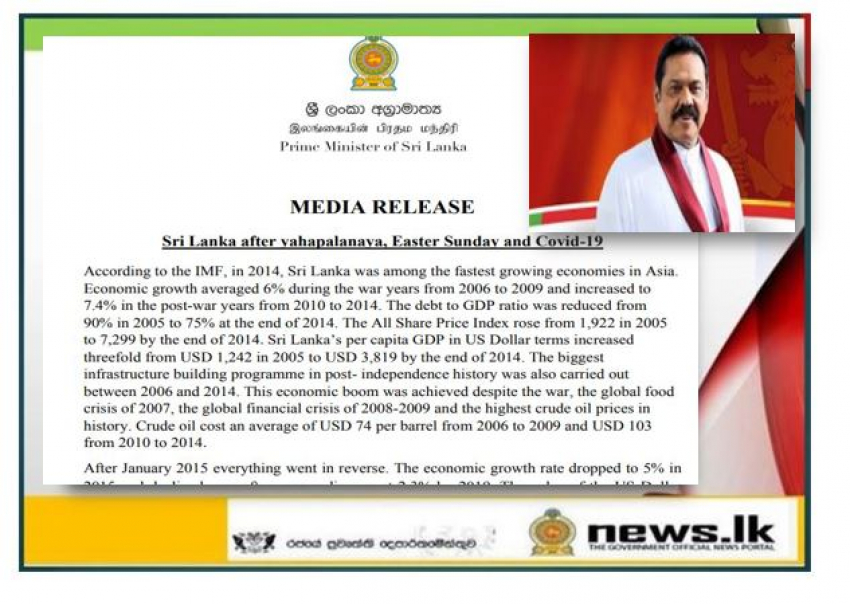According to the IMF, in 2014, Sri Lanka was among the fastest growing economies in Asia. Economic growth averaged 6% during the war years from 2006 to 2009 and increased to 7.4% in the post-war years from 2010 to 2014. The debt to GDP ratio was reduced from 90% in 2005 to 75% at the end of 2014. The All Share Price Index rose from 1,922 in 2005 to 7,299 by the end of 2014. Sri Lanka’s per capita GDP in US Dollar terms increased threefold from USD 1,242 in 2005 to USD 3,819 by the end of 2014. The biggest infrastructure building programme in post- independence history was also carried out between 2006 and 2014. This economic boom was achieved despite the war, the global food crisis of 2007, the global financial crisis of 2008-2009 and the highest crude oil prices in history. Crude oil cost an average of USD 74 per barrel from 2006 to 2009 and USD 103 from 2010 to 2014.
After January 2015 everything went in reverse. The economic growth rate dropped to 5% in 2015 and declined year after year ending up at 2.3% by 2019. The value of the US Dollar appreciated against the Rupee from Rs.130 in 2014 to 181 by October 2019. Sri Lanka’s total outstanding debt increased by 74.4% from Rs. 7.39 trillion at the end of 2014, to Rs.12.89 trillion by October 2019. Between January 2015 and October 2019, the total foreign currency borrowings of the yahapalana government in the form of Sovereign Bonds, Sri Lanka Development Bonds, Syndicated Loans and Currency Swaps totaled over USD 26 billion. Despite this borrowing spree, absolutely nothing of lasting value was built by the yahapalana government. The All Share Price Index declined from 7,299 in 2014 to 5,990 by the end of October 2019. Yet during the entire period from 2015 to 2019 the average price of crude oil was USD 60 per barrel – the lowest in recent history.
There were no external, global reasons for this economic collapse. India and Bangladesh experienced robust growth between 2015 and 2019. The Easter Sunday bombings of April 2019 exacerbated the yahapalana recession. On 16 November 2019, President Gotabhaya Rajapaksa inherited an economy that was in shambles. It was in such a context that the entire world was engulfed by the Covid-19 pandemic. A worldwide economic crisis reminiscent of the 1930s Great Depression is widely expected to follow the Covid-19 pandemic. In this new global environment, even the option of going overseas in search of greener pastures will be very limited because all countries will be facing economic hardship and mass unemployment. The Covid-19 pandemic has left all Sri Lankans with only one option – building Sri Lanka. The choice is stark - pull together or perish.
When the Secretary to the President Dr P.B.Jayasundera in his capacity as the foremost officer of the public service, recently appealed to public servants to contribute whatever they can from their salaries to tide over this crisis, the opposition attacked him viciously. Knowing fully well that this was only a request for voluntary contributions, they tried to portray it as a compulsory deduction. Dr. Jayasundera played a central role in the 2006-2014 economic boom. The opposition obviously hopes to undermine the government’s economic recovery efforts by singling out capable state officials like him for attack.
We should all realize that this yahapalana political culture of vilification and false propaganda has no place in the post-Covid-19 world. In the difficult times that lie ahead, Sri Lanka’s economic survival and the futures of our children, depend on the vision, ability and skill of those running the country. German Chancellor Angela Merkel recently stated that Covid-19 had hit Germany at a time when the economy was doing well and they had the strength to face the crisis. The situation in Sri Lanka was the exact opposite. We should all be mindful of this reality and make our choices and decisions accordingly. Everyone knows what would have happened if the yahapalana cabal had been in power when the Covid-19 pandemic hit Sri Lanka. The team that is now running the country from the President downwards, won a war that was deemed unwinnable, and presided over the greatest economic boom since independence despite impossible odds between 2006 and 2014. That is the kind of leadership needed to steer this country forward in the post-Covid-19 world.
Mahinda Rajapaksa
Prime Minister




















